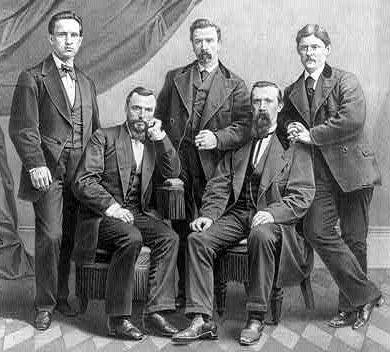Met(a) Gala 2022: Did Anyone Understand the Assignment?
- Melissa Lupo

- May 4, 2022
- 5 min read
Updated: Aug 23, 2023
The algorithm soup that resulted in the invite list for this years Met Gala, themed The Gilded Age, instead looks more like a Meta Gala written by DeepCoder software that has started programming itself.
I don't blame Anna. She's doing the job she's been called to do and if we're being quite frank, she gave the kids everything they asked for and everything they're already doing...and they still got it wrong.
The wide and oh-so-Instagrammable puff sleeves, powerful and voluptuous backsides that are finally getting the attention they deserve, the long and structural braiding, and the nipped in waistlines that are all making an appearance in 2022 fashion, were also some of the most identifiable design traits representing the era between the 1870's and 1890's, fondly known as The Gilded Age. So where's all this energy for the Met?
THE ASSIGNMENT
It seems like a perfect moment to marry two epic fashion eras. We love the Gilded Age. We made a show on HBO called The Gilded Age. And we have Bridgerton. There was reference. There was an assignment. It's literally what we're doing when we're not even trying.

So what happened?
Instead of the 1870's-1890's, we saw classic looks from the 1950's, a lot of inspiration from the roaring 20's, a particular interest in the 1930's, lot's of black, many looks that could have been styled for any event, more black, even more looks that should never have seen the light of day, followed by more black of course. Whatever the theme was supposed to be, it wasn't just lost, it was deceased. It appears that the data-driven marketing strategy of the individual brands took over and the result?
Cringe.
There are countless events and opportunities during the year to show off creative looks and experiment with style. The Met Gala though, besides being an event that Anna Wintour took on to help raise money for the Costume Institute, was the fashion event of the year for fashion people. It's an honor for any stylist to be able to present in front of their peers and an exciting test of skill to see how talents are applied in context.
The freedom to choose how to interpret a theme is part of the fun, and in 2022, freedom is in the front and center of everyone's minds. After being trapped in isolation and having strict rules dictated to us for almost two years, breaking the rules feels sweeter than ever. Or at least it should.
It's supposed to be a fundraiser with a theme, but neither of those narratives made an appearance and none of it made really any sense at all. Instead of a studied and creative Met Gala full of big personalities, it looked more like the Meta Gala from a future Metaverse nightmare where everything is glitching and it's not even glitchcore.
Less than 24 hours after the event, the memes are swarming, cementing the fate of generations who will wonder when and where fashion finally became unhinged.
How did this happen?
The issue is that the sovereign freedom to choose and expand on a theme has been passed on from trusting human experience to an algorithm, starting with the guest list. Celebrity appearances weren't made up of people who love fashion and have a passion for preserving our history. If that was the case, Kim Kardashian wouldn't be in Marilyn Monroe's dress and we would be discussing the misappropriation of historical artifacts instead of her diet and how that makes some people sad. I know Indiana Jones would have something to say about this.

If enough of these guests had actually spent time in front of a historical gown collection at the Met or in any museum for that matter, in reverence of the events that happened in that very fabric, with respect for those who came before them and for what those people did inside those clothes, maybe it would increase their awareness of our collective goal to preserve something that actually belongs to all of us: the history of fashion. But it is the guests fault? We know that celebs rarely dress themselves and that stylists are under the thumb of what the brands decide, that is - if they want their work to see the light of day.
So where do we go from here?
We deserved better. Bringing attention to the event was always Anna's goal and celebrities are part of the equation, but at time when the world has more celebrities than ever, why them? Why invite sloppy guests to an event you've gone to so much work to curate, who flaunt ambivalence, bragging about not even having read the brief, like Kourtney Kardashian, who responds to a reporter laughing, "I honestly didn't even think about it".
Even more how do these people get invited back? If this is about donations, we know there's other money. This doesn't happen at other important events for the arts, like the Biennale for instance because at every other event to honor the arts, rules exists to protect the integrity of curation and the artists.
Seasoned Luxury Brand Strategist, Kate Lillian Muir of A Good Plan Group from Melbourne, Australia who has been working in fashion and the arts, including the Athens Biennale for years, gives some insight.
"The value of having the theme is to take a cross-section of a moment in time. We should be able to see, feel, and share the political statement and the art. We have to ask, what is the take-away? What have we gained? Other than clickbait, what have we received? Have I been inspired to take an action? Have I been moved ? What's the behavior change they want from us? We have to consider the role of the chairperson as the harbinger. For the Biennale for instance, the idea has to be presented well in advance and if it's not in theme, it wouldn't even be considered.
If we removed the financial gain of the individuals and made landing the brief the most important part, we would see the most extraordinary, inspired and thoughtful design. We'd see it from Valentino, we'd see it from the student at Central Saint Martins. It begs the question: if we took money out of the equation, would we actually be richer"
Here's our edit of who did and did not understand the assignment.
DID NOT UNDERSTAND THE ASSIGNMENT
UNDERSTOOD THE ASSIGNMENT
So what did we accomplish? An event curated according to what data shows will trend on social media and algorithmically correct content, on par with the creatively anemic Coachella influencer Olympics?
Code is written to make one choice or another: "if this, then that" unlike humans who express duality, or the ability to hold two opposing thoughts and find both true at the same time. What looks like a metaverse train wreck in Doodle town to us is most likely killing it with views and engagement...but at what cost if not of it actually makes sense together?
Hype is part of the game and can say a lot about where we are a society but if we take the human out of the hype, it's doesn't represent anyone but an algorithm.

















































































Comments